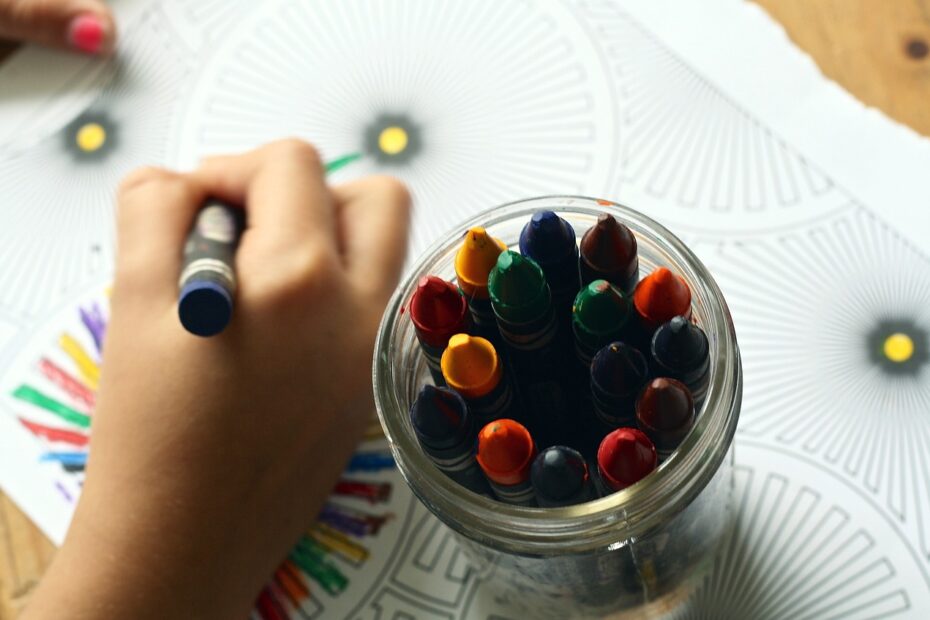Are you a new parent looking to give your child the best start in life? Look no further than “From Crib to Kindergarten: Nurturing Your Child’s Learning from Day One.” This comprehensive guide offers practical tips and insights on how to foster your child’s development from infancy through their early years. Whether it’s creating a stimulating environment, encouraging their curiosity, or fostering their language skills, this article has got you covered. Get ready to embark on an exciting journey of nurturing your child’s learning from the very beginning.

The Importance of Early Learning
As a parent, you play a crucial role in your child’s development. From the moment they are born, you have the opportunity to shape their future by providing them with a strong foundation for learning. Early learning is essential because it sets the stage for a lifetime of growth and development. By engaging your child in stimulating activities and creating a nurturing environment, you can help them reach their full potential.
Building a Strong Foundation
Building a strong foundation starts with understanding the importance of brain development in the early years. During the first few years of life, a child’s brain undergoes significant growth and development. This period, often referred to as the critical period, is when the brain is most receptive to learning. By providing your child with age-appropriate stimuli and experiences, you can help optimize their brain’s development, setting them up for success in the future.
Brain Development in the Early Years
During the early years, your child’s brain is like a sponge, soaking up information and forming connections. It is during this time that they develop essential cognitive, language, motor, and social skills. By engaging in activities that stimulate their senses and promote brain development, you are giving them the tools they need to thrive academically, socially, and emotionally.
Benefits of Early Learning
Engaging in early learning activities has numerous benefits for your child. Research has shown that children who participate in high-quality early learning experiences tend to have better emotional regulation, language and communication skills, social competence, and cognitive abilities. They are also more likely to succeed academically and have better long-term outcomes. By investing in early learning, you are setting your child up for a lifetime of success and fulfillment.
Creating a Stimulating Environment
One way to support your child’s early learning is by creating a stimulating environment at home. This can be achieved through thoughtful design choices, engaging toys and activities, and the introduction of books and reading.
Designing a Safe and Nurturing Crib
The crib is often the first space where your baby spends a significant amount of time. It is important to create a safe and nurturing environment that promotes their development. Choose a crib that meets safety standards and is free from any potential hazards. Decorate the crib with soft and visually stimulating mobiles or wall decals to engage your baby’s senses.
Engaging Toys and Activities
Toys and activities play a vital role in your child’s early learning journey. Look for toys that are developmentally appropriate and foster different skills such as fine and gross motor skills, problem-solving, and creativity. Engage in interactive play with your child, providing them with plenty of opportunities to explore, discover, and learn.
Introducing Books and Reading
Reading to your child from an early age has numerous benefits. It helps develop their language skills, introduces them to new concepts and ideas, and fosters a love for reading that can last a lifetime. Make reading a part of your daily routine, and choose age-appropriate books that are engaging and colorful. Encourage your child to interact with the story by asking questions, pointing at pictures, and talking about the characters and events.
Promoting Language and Communication Skills
Language and communication skills are crucial for your child’s overall development. By actively promoting these skills, you are giving your child the tools they need to express themselves, understand others, and navigate the world around them.
Talking and Singing to Your Baby
From the moment your baby is born, talking and singing to them is essential for their language development. Narrate your daily activities, describe the world around them, and sing songs or nursery rhymes. This constant exposure to language helps build your child’s vocabulary and strengthens their comprehension skills.
Encouraging Conversations
As your child grows, encourage conversations by asking open-ended questions and actively listening to their responses. Engage in meaningful conversations by discussing their interests, experiences, and opinions. This not only helps develop their language skills but also promotes critical thinking and social connection.
Playing with Sounds and Rhymes
Playing with sounds and rhymes is a fun and effective way to support your child’s phonemic awareness, which is crucial for later reading and writing skills. Sing songs, recite nursery rhymes, and play with different sounds and words. This playful approach to language helps your child develop an ear for sounds and enhances their ability to manipulate words and sounds.
Fostering Cognitive Development
Cognitive development refers to your child’s ability to think, reason, problem-solve, and understand the world around them. By engaging in activities that stimulate cognitive development, you are laying the foundation for your child’s future learning and academic success.
Problem-Solving and Puzzle Play
Encourage your child to engage in problem-solving activities and puzzles. Provide age-appropriate puzzles that challenge their thinking and require them to use their problem-solving skills. This helps develop their critical thinking abilities and enhances their ability to analyze and solve complex problems.
Shape and Color Recognition
Shape and color recognition activities are not only fun but also play a vital role in developing your child’s cognitive abilities. Help your child recognize and name different shapes and colors by pointing them out in their environment. Incorporate shape and color recognition games into your daily routine, such as sorting toys by shape or color.
Matching and Sorting Activities
Matching and sorting activities help your child develop important cognitive skills, such as classification and categorization. Provide your child with opportunities to match and sort objects based on different attributes, such as size, color, or shape. This helps them develop their ability to identify similarities and differences and strengthens their logical reasoning skills.

Developing Motor Skills
Motor skills refer to your child’s ability to use their muscles and coordinate their movements. By engaging in activities that promote motor skill development, you are helping your child build strength, coordination, and control over their body.
Tummy Time and Crawling
Tummy time is essential for your baby’s motor development. It helps strengthen their neck and shoulder muscles, promotes coordination, and prepares them for crawling and eventually walking. Encourage tummy time by placing your baby on their stomach for short periods each day. As they grow, support their crawling attempts and provide them with a safe and spacious area to explore.
Fine Motor Activities
Fine motor skills involve the use of small muscles, such as those in the fingers and hands. Encourage your child’s fine motor development by providing them with age-appropriate toys and activities that require precise movements, such as building blocks, puzzles, and arts and crafts. These activities help develop their hand-eye coordination, dexterity, and ability to manipulate objects.
Gross Motor Play
Gross motor play involves activities that engage the large muscles of the body, such as those used in running, jumping, and climbing. Provide your child with ample opportunities for gross motor play, both indoors and outdoors. Encourage them to explore their surroundings, engage in physical activities, and participate in games and sports that promote coordination and balance.
Introducing Social Skills
Developing social skills is essential for your child’s overall well-being and success in life. By providing them with opportunities to engage with others and teaching them important social skills, you are setting the stage for positive social interactions and relationships.
Playing with Others
Engage your child in playdates and encourage them to interact with other children. Playing with others helps develop important social skills, such as sharing, taking turns, and cooperation. Foster a positive and inclusive play environment where your child feels comfortable and supported in their interactions with others.
Sharing and Taking Turns
Teach your child the importance of sharing and taking turns from an early age. Model these behaviors and provide your child with opportunities to practice them. Encourage them to share their toys, take turns in games, and cooperate with others. These skills are essential for building positive relationships and participating in group activities.
Empathy and Emotional Regulation
Empathy and emotional regulation are key components of social skills. Help your child develop empathy by teaching them to understand and acknowledge the feelings of others. Encourage them to express their own emotions in a healthy and respectful manner. Provide a nurturing and supportive environment where your child feels safe to explore and express their emotions.

Encouraging Independence and Autonomy
As your child grows, it is important to foster their independence and autonomy. By allowing them to explore, make decisions, and develop self-help skills, you are helping them become confident and capable individuals.
Allowing for Self-Exploration
Give your child the freedom to explore their environment and make their own discoveries. Create a safe and stimulating environment that encourages curiosity and allows for independent play. Provide them with age-appropriate toys and materials that foster exploration and creativity.
Teaching Basic Self-Help Skills
Encourage your child to develop basic self-help skills, such as dressing themselves, feeding themselves, and using the bathroom. Provide them with opportunities to practice these skills and offer support and guidance when needed. By learning these skills, your child gains a sense of independence and self-confidence.
Supporting Decision Making
As your child grows, involve them in decision-making processes. Allow them to make choices within appropriate boundaries, such as choosing their outfits or deciding what activities to engage in. By providing opportunities for decision making, you are helping your child develop their problem-solving skills and autonomy.
Nurturing a Love for Learning
One of the greatest gifts you can give your child is a love for learning. By making learning fun, encouraging exploration, and integrating learning into daily routines, you are nurturing their natural curiosity and instilling a lifelong passion for knowledge.
Making Learning Fun
Learning doesn’t have to be confined to textbooks and worksheets. Make learning fun and engaging by incorporating games, hands-on activities, and sensory experiences into your child’s daily routine. This helps them develop a positive attitude towards learning and fosters a love for discovery and exploration.
Exploring Nature and the World
Nature and the world around us offer endless opportunities for learning. Take your child on nature walks, visit museums, parks, and zoos, and encourage them to ask questions and explore their surroundings. By exposing them to different environments and experiences, you are broadening their horizons and encouraging a sense of wonder and curiosity.
Integrating Learning into Daily Routines
Learning doesn’t happen only in designated “learning” moments. Incorporate learning into your child’s daily routines by engaging in conversations, reading together, and involving them in age-appropriate household tasks. By making learning a part of their everyday life, you are fostering a love for continuous learning and growth.
The Role of Parents and Caregivers
As a parent or caregiver, you play a vital role in supporting your child’s learning and development. Your love, guidance, and involvement in their education can make a significant difference in their academic and personal success.
Modeling Lifelong Learning
Be a role model for your child by demonstrating a love for lifelong learning. Engage in your own learning pursuits, whether it’s reading books, attending classes, or pursuing hobbies. Show your child the joy and fulfillment that comes from acquiring new knowledge and skills. This sends a powerful message that learning is a lifelong journey.
Providing Emotional Support
Emotional support is crucial for your child’s overall well-being and learning. Create a nurturing and supportive environment where your child feels safe, loved, and accepted. Provide them with a listening ear, validate their feelings, and offer guidance and reassurance when needed. By prioritizing their emotional well-being, you are creating a solid foundation for their learning and growth.
Collaborating with Educators
Collaborate with your child’s educators to support their learning journey. Communicate regularly with their teachers, attend parent-teacher conferences, and participate in school events. Share information about your child’s interests, strengths, and areas for growth. By working together, you can ensure that your child receives the necessary support and resources to thrive academically and socially.
Transitioning to Kindergarten
The transition to kindergarten is a significant milestone in your child’s educational journey. By preparing them for this next step and supporting their socialization and school readiness, you can help ensure a smooth transition.
Preparing for the Next Step
As your child prepares to enter kindergarten, it is important to familiarize them with the routines and expectations of a school setting. Talk to them about what to expect, visit the school if possible, and read books that explore the theme of starting school. By preparing your child in advance, you can alleviate anxiety and help them feel more confident and excited about this new chapter.
Socialization and School Readiness
Socialization is a critical aspect of kindergarten readiness. Provide opportunities for your child to interact with other children, whether through playdates, preschool, or community activities. Help them develop important social skills, such as sharing, taking turns, and cooperating, which are essential for successful group participation in kindergarten.
Supporting a Smooth Transition
Support your child’s transition to kindergarten by maintaining a consistent routine at home. Establishing regular sleeping and eating schedules helps ensure they are well-rested and ready for school. Additionally, continue to engage in learning activities at home and support their academic growth. By nurturing their love for learning and providing a stable and supportive environment, you are setting the stage for a successful transition and a positive kindergarten experience.
In conclusion, early learning is integral to your child’s overall development and future success. By creating a stimulating environment, promoting language and communication skills, fostering cognitive and motor development, introducing social skills, encouraging independence and autonomy, nurturing a love for learning, and collaborating with caregivers and educators, you are providing your child with a solid foundation for lifelong learning and growth. Remember, every interaction with your child is an opportunity for learning and connection, so embrace it and enjoy the journey of nurturing your child’s learning from day one.

